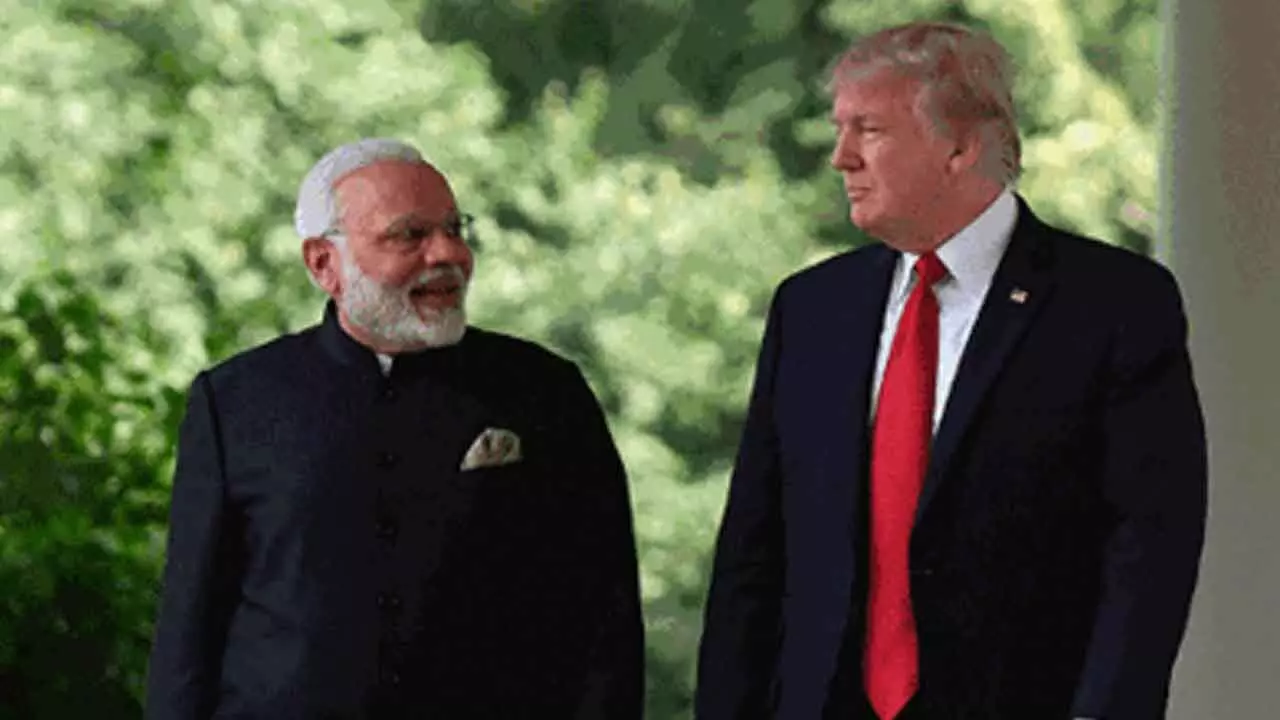Diplomatic Standoff: Modi Rejects US Mediation as Trump Doubles Down on India-Pakistan Peace Claims
Prime Minister Modi firmly tells US President Trump that India will "never accept mediation" with Pakistan, even as Trump reiterates his claims of de-escalation. This article explores the nuanced diplomatic exchange and its implications for India-US-Pakistan relations.
Diplomatic Tug-of-War: Modi Rejects Mediation as Trump Reiterates Peace Claims Ahead of Munir Meeting

A clear and unequivocal message was delivered from New Delhi to Washington on Wednesday: India will not, and never has, accepted third-party mediation in its relationship with Pakistan. This firm stance was conveyed by Prime Minister Narendra Modi directly to US President Donald Trump during a phone call, according to India's Foreign Secretary Vikram Misri. The conversation occurred just hours before President Trump was set to host Pakistan's Chief of Army Staff, General Asim Munir, for a lunch meeting at the White House, where Trump once again touted his role in "stopping the war" between the two nuclear-armed neighbours.
This latest diplomatic exchange marks the fourteenth time President Trump has publicly claimed credit for de-escalating tensions between India and Pakistan following the recent cessation of cross-border military actions, which began on May 10th. Trump's repeated assertions have often been framed as a Washington-brokered "ceasefire," a narrative New Delhi has consistently refuted.
Foreign Secretary Misri, in a detailed statement, clarified that the decision to halt military actions between India and Pakistan was reached directly between the two nations through existing military channels, and crucially, was initiated at Pakistan's request. "Prime Minister Modi clearly conveyed to President Trump that at no point during this entire sequence of events was there any discussion, at any level, on an India-US trade deal, or any proposal for mediation by the US between India and Pakistan," Misri stated, emphasizing the complete political consensus within India on this matter.
The telephonic conversation, reportedly requested by President Trump after he was unable to meet PM Modi on the sidelines of the G7 Summit in Alberta, Canada, provided Modi with the opportunity to directly address the mediation claims. While bilateral meetings at such summits can materialize at the last minute, Trump was not initially on Modi's list of scheduled meetings. President Trump also reportedly enquired if Modi could make a stopover in the US on his way back from Canada, but the Prime Minister cited prior commitments, proceeding instead to Zagreb, Croatia.
During their nearly 35-minute call, Prime Minister Modi reportedly detailed Operation Sindoor, India's robust response to the April 22nd Pahalgam terror attack, in which 26 people lost their lives. Modi underscored that India now views terrorism not as a "proxy war, but as a war itself," and that Operation Sindoor is ongoing. He explained that India's actions were targeted, measured, and non-escalatory, aimed solely at terrorist infrastructure within Pakistan and Pakistan-occupied Kashmir, after which Pakistan was compelled to request a cessation of hostilities due to significant damage to their military airbases.
Despite India's clear articulation, President Trump reiterated his claims to reporters before his meeting with General Munir, stating, "I stopped the war between Pakistan and India. This man [Munir] was extremely influential in stopping it from the Pakistan side, Modi from the India side and others. They were going at it and they’re both nuclear countries. I got it stopped… I stopped a war between two major nations, major nuclear nations."
The timing of Trump's meeting with General Munir, despite India's diplomatic efforts to isolate Pakistan over its use of terrorism as state policy, has raised eyebrows in New Delhi. Pakistan's Army Chief, in particular, has been a contentious figure, having recently resurrected the "Kashmir is the jugular vein of Pakistan" narrative. Pakistan's daily Dawn, however, framed the lunch meeting as a "major diplomatic win" for Islamabad, aiming to counter narratives of India's diplomatic successes in Washington.
The US has, in recent times, acknowledged Pakistan's cooperation in counter-terrorism, particularly concerning ISIS-Khorasan. General Michael Kurilla of CENTCOM recently praised Pakistan as a "phenomenal partner" in this regard and spoke of General Munir's proactive communication regarding the capture of Mohammad Sharifullah, a key figure in the 2021 Abbey Gate bombing.
As diplomatic efforts continue to unfold, the Indian Ministry of External Affairs has consistently maintained that there was no mediation, though it has previously sidestepped questions on whether formal protests were lodged with the US regarding Trump's persistent claims. With Prime Minister Modi now directly addressing the issue, India's unwavering stance against third-party intervention in its bilateral matters with Pakistan has been firmly reaffirmed on the global stage.

